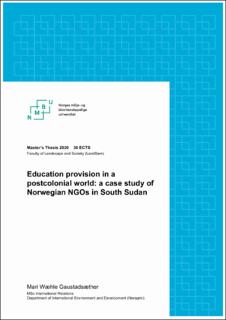| dc.description.abstract | This thesis uses postcolonial theory and the concept of decolonising education to examine the education practices of four Norwegian NGOs in South Sudan. Over the last few years, there has been an upsurge in debates about the need to decolonise academia and include indigenous knowledge systems (IKS) in education. However, it seems that international non-governmental organisations (INGOs) have not faced the same scrutiny or call for investigation of their education provision. As INGOs play an important part in education provision around the world, the thesis calls for their practices to be analysed in light of decolonisation theory, so as to situate their role and critically examine their practices. The findings will suggest that there is no clear and organisation-wide strategy by the NGOs to decolonise education, and that the default response to the question of education provision is that interventions are aligned to national priorities and regulations set by the South Sudanese government and donors. The thesis argues that there needs to be a wider understanding of the positionality and power of INGOs in educational decolonisation. The global architecture of education makes it difficult for the global South to decolonise without the reflection, acknowledgement of the issue, and the will to change these practices by those who are providing the education.
At the same time, the thesis finds that there is some incorporation of local knowledge by the Norwegian NGOs. This varies between including local music, songs, dance and storytelling, to using local examples and names to localise learning, and collating local stories and nursery rhymes in a published manner. There are also a couple examples of deliberately using decolonial theory, such as basing a life-skills programme on Freire’s pedagogy, and including indigenous knowledges and global South scholars in a master’s programme. Thus, the NGOs can be situated as trying to incorporate some elements of local knowledge, but not as structuring their whole education programmes according to the concept of decolonising education. The thesis argues it is important to see how INGOs are situated within decolonisation of education. This can give us further insight on how to provide quality education in the relevant country. Applying the concept of decolonising education can broaden our view of INGOs’ role in education provision beyond simply being service providers where the government fails. | en_US |

